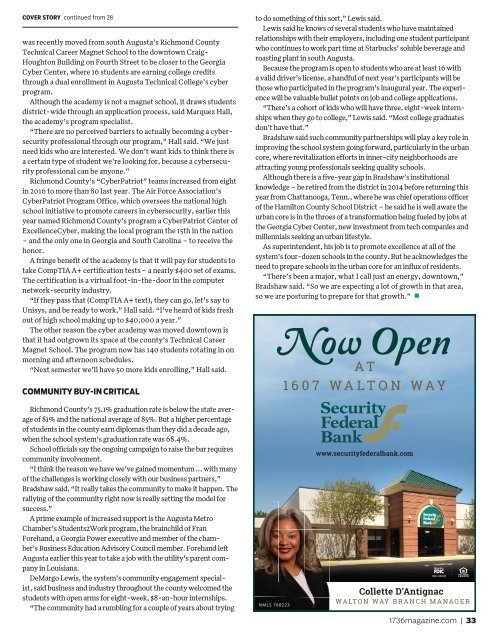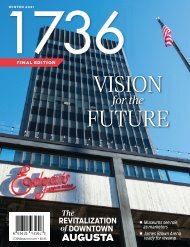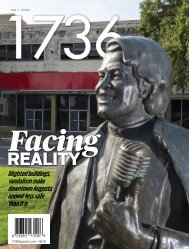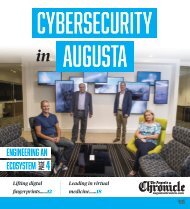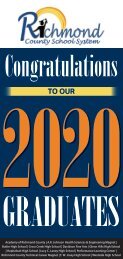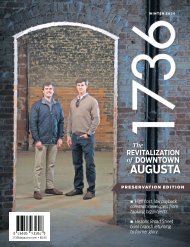Education Edition - 1736 Magazine, Fall 2019
- No tags were found...
Create successful ePaper yourself
Turn your PDF publications into a flip-book with our unique Google optimized e-Paper software.
COVER STORY continued from 28<br />
was recently moved from south Augusta’s Richmond County<br />
Technical Career Magnet School to the downtown Craig-<br />
Houghton Building on Fourth Street to be closer to the Georgia<br />
Cyber Center, where 16 students are earning college credits<br />
through a dual enrollment in Augusta Technical College’s cyber<br />
program.<br />
Although the academy is not a magnet school, it draws students<br />
district-wide through an application process, said Marquez Hall,<br />
the academy’s program specialist.<br />
“There are no perceived barriers to actually becoming a cybersecurity<br />
professional through our program,” Hall said. “We just<br />
need kids who are interested. We don’t want kids to think there is<br />
a certain type of student we’re looking for, because a cybersecurity<br />
professional can be anyone.”<br />
Richmond County’s “CyberPatriot” teams increased from eight<br />
in 2016 to more than 80 last year. The Air Force Association’s<br />
CyberPatriot Program Office, which oversees the national high<br />
school initiative to promote careers in cybersecurity, earlier this<br />
year named Richmond County’s program a CyberPatriot Center of<br />
ExcellenceCyber, making the local program the 15th in the nation<br />
– and the only one in Georgia and South Carolina – to receive the<br />
honor.<br />
A fringe benefit of the academy is that it will pay for students to<br />
take CompTIA A+ certification tests – a nearly $400 set of exams.<br />
The certification is a virtual foot-in-the-door in the computer<br />
network-security industry.<br />
“If they pass that (CompTIA A+ text), they can go, let’s say to<br />
Unisys, and be ready to work,” Hall said. “I’ve heard of kids fresh<br />
out of high school making up to $40,000 a year.”<br />
The other reason the cyber academy was moved downtown is<br />
that it had outgrown its space at the county’s Technical Career<br />
Magnet School. The program now has 140 students rotating in on<br />
morning and afternoon schedules.<br />
“Next semester we’ll have 50 more kids enrolling,” Hall said.<br />
to do something of this sort,” Lewis said.<br />
Lewis said he knows of several students who have maintained<br />
relationships with their employers, including one student participant<br />
who continues to work part time at Starbucks’ soluble beverage and<br />
roasting plant in south Augusta.<br />
Because the program is open to students who are at least 16 with<br />
a valid driver’s license, a handful of next year’s participants will be<br />
those who participated in the program’s inaugural year. The experience<br />
will be valuable bullet points on job and college applications.<br />
“There’s a cohort of kids who will have three, eight-week internships<br />
when they go to college,” Lewis said. “Most college graduates<br />
don’t have that.”<br />
Bradshaw said such community partnerships will play a key role in<br />
improving the school system going forward, particularly in the urban<br />
core, where revitalization efforts in inner-city neighborhoods are<br />
attracting young professionals seeking quality schools.<br />
Although there is a five-year gap in Bradshaw’s institutional<br />
knowledge – he retired from the district in 2014 before returning this<br />
year from Chattanooga, Tenn., where he was chief operations officer<br />
of the Hamilton County School District – he said he is well aware the<br />
urban core is in the throes of a transformation being fueled by jobs at<br />
the Georgia Cyber Center, new investment from tech companies and<br />
millennials seeking an urban lifestyle.<br />
As superintendent, his job is to promote excellence at all of the<br />
system’s four-dozen schools in the county. But he acknowledges the<br />
need to prepare schools in the urban core for an influx of residents.<br />
“There’s been a major, what I call just an energy, downtown,”<br />
Bradshaw said. “So we are expecting a lot of growth in that area,<br />
so we are posturing to prepare for that growth.”<br />
COMMUNITY BUY-IN CRITICAL<br />
Richmond County’s 75.1% graduation rate is below the state average<br />
of 81% and the national average of 85%. But a higher percentage<br />
of students in the county earn diplomas than they did a decade ago,<br />
when the school system’s graduation rate was 68.4%.<br />
School officials say the ongoing campaign to raise the bar requires<br />
community involvement.<br />
“I think the reason we have we’ve gained momentum ... with many<br />
of the challenges is working closely with our business partners,”<br />
Bradshaw said. “It really takes the community to make it happen. The<br />
rallying of the community right now is really setting the model for<br />
success.”<br />
A prime example of increased support is the Augusta Metro<br />
Chamber’s Students2Work program, the brainchild of Fran<br />
Forehand, a Georgia Power executive and member of the chamber’s<br />
Business <strong>Education</strong> Advisory Council member. Forehand left<br />
Augusta earlier this year to take a job with the utility’s parent company<br />
in Louisiana.<br />
DeMargo Lewis, the system’s community engagement specialist,<br />
said business and industry throughout the county welcomed the<br />
students with open arms for eight-week, $8-an-hour internships.<br />
“The community had a rumbling for a couple of years about trying<br />
<strong>1736</strong>magazine.com | 33<br />
1117_T_13_AM____.indd 33<br />
10/25/<strong>2019</strong> 11:56:02 AM


